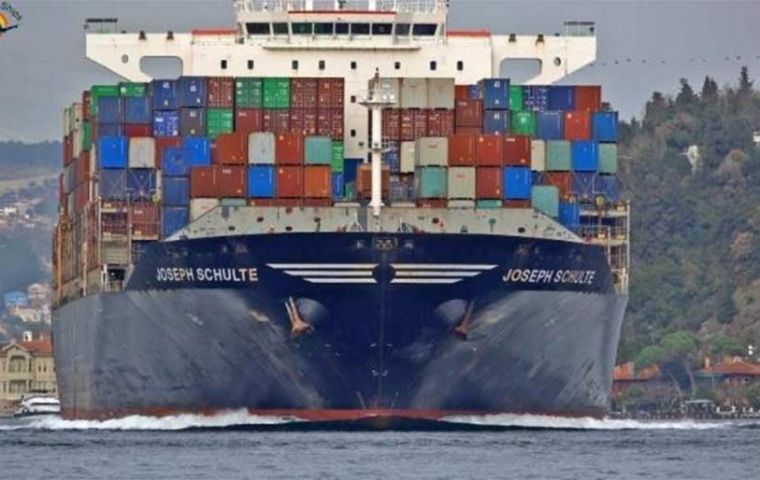MercoPress. South Atlantic News Agency
Despite Russian threats vessel sails from Odessa to Istanbul with 30,000 tons of cargo
 The German/Chinese-owned cargo ship was the first vessel to make the journey out of Ukrainian waters since July,
The German/Chinese-owned cargo ship was the first vessel to make the journey out of Ukrainian waters since July, The passage of a cargo ship from Ukraine to Turkey this week vindicated Kyiv’s gamble that Russia would not act on threats to attack commercial shipping in the Black Sea. But the successful gambit leaves a bigger question for Ukraine: Will any other commercial vessels follow the Joseph Schulte and dare to call Russia’s bluff?
The German/Chinese-owned cargo ship was the first vessel to make the journey out of Ukrainian waters since July, when Russia warned it would consider any civilian vessel leaving Ukraine’s ports as military targets.
Its daring journey was an attempt to show Ukraine could carve out a safe corridor across the Black Sea that was resilient enough to keep its exports flowing despite Russian belligerence.
Ukraine’s president Volodymyr Zelenskyy described the ship’s voyage as an “important step towards restoring the freedom of navigation in the Black Sea”. Last week, Kyiv announced it was seeking to set up a “humanitarian” corridor in the Black Sea allowing cargo ships to leave its ports safely. But analysts said commercial shipping, on a significant scale, was unlikely to be restored without Russia’s agreement.
The Joseph Schulte’s arrival in Istanbul after a two-day voyage from Odessa where it had been moored since February 2022 followed weeks of rising tensions over the shipping lanes. Ukraine issued threats to hit vessels heading to Russian ports — and targeted a Russian oil tanker in August — while Russia fired warning shots at a Turkish vessel heading for a Ukrainian port on the Danube river.
Even so, Ukraine proceeded with its experiment, confident that its onshore defence systems — with a range of about 100 nautical miles — could deter Russia’s navy from mounting an assault.
While travelling through Ukrainian waters the Joseph Schulte kept within this corridor, which Ukraine calls its “zone of destruction” [for hostile Russian ships], according to Dmytro Pletenchuk, a spokesperson for Ukraine’s navy. Ukrainian anti-ship rocket launchers are lined up along the coast to defend against any naval attacks within their range.
The vessel carried 30,000 tons of cargo, including foodstuffs. Its owners declined to comment on any specifics regarding the voyage and stressed that the container vessel “is not a grain carrier”.
Wheat prices fell after it left Ukraine’s waters but Carlos Mera, head of agri commodities market research at Rabobank in London, said it was unlikely to be the only factor in the “extremely volatile” market.
Evidence of other vessels successfully picking up cargo from Ukraine, rather than just leaving its waters, could bring down prices, Mera said. But this remained “very unlikely” without agreement from Russia.
Meanwhile in related news Ukraine and Romania signed an agreement to boost Kyiv's exports of grains through Romania. The accord was signed during a trip by Ukrainian Prime Minister Denys Shmyhal to Bucharest, for talks with his Romanian counterpart Marcel Ciolacu.
Ciolacu told a news conference after the meeting that he hopes Romania can transport more than 60% of Ukraine’s grain exports. The Romanian leader added that the Black Sea port of Constanta will remain a key transport route for getting Ukraine’s goods to the international market. The Sulina Channel, an arm of the Danube River on what is Europe’s second-longest river and a key transport route, will also play a role.




Top Comments
Disclaimer & comment rulesCommenting for this story is now closed.
If you have a Facebook account, become a fan and comment on our Facebook Page!